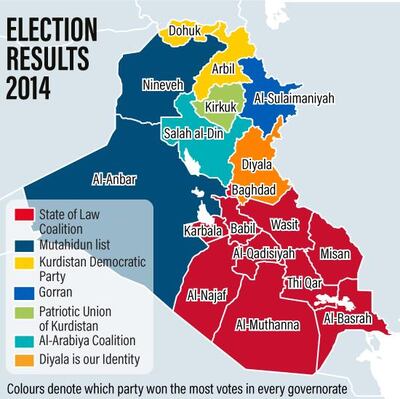Washington will be closely watching the first post-ISIS election in Iraq this weekend. The results could be critical for US interests, Baghdad’s regional trajectory and wider geopolitics.
While the US administration has not explicitly picked a favourite in this election, its bet is on the continued security, economic and regional policies of Prime Minister Haider Al Abadi, the man who successfully rebuilt the Iraqi army and defeated ISIS.
There are various scenarios in this election, ranging from continuity, new constraints on the US or a nightmare scenario that alienates Washington’s allies, according to Randa Slim, Director of Track II Dialogues Program at the Middle East Institute.
The coalition formation when the votes are counted, rather than the immediate results of the election, are what will be crucial for Washington, Ms Slim said in a phone call with The National.
She explained the worst case scenario for the US would be if the Iranian-backed Popular Mobilization Force (PMF), the coalition that includes the feared Shiite militia known as the Hashed Al Shaabi, comes ahead with a major win.
_____________
Iraq elections
Will Haider Al Abadi be re-elected?
military and diaspora begin casting their votes
Country readies for first polls since end of ISIS war
_____________
If it achieves close to what Mr Abadi gets, it could emerge as a power broker to form the next government.
“They would bring Sunnis and Kurdish political forces aligned with them and deal a blow to Washington”, she said. Since 2014, the US has been betting on Mr Abadi and his moderate vision for the country.
The second worst-case scenario for Washington, though not a nightmare, would be in a narrow victory for Mr Abadi, Ms Slim argued.
In that case “he can come out on top, but not with enough majority to form a government”, she said. Such results could force the Iraqi prime minister to appease the PMF and outbid his predecessor and current vice-president, Nouri Maliki, in order to remain as Prime Minister.
Those two scenarios are very problematic for Washington because they threaten the US military’s presence in the country, would drive even Baghdad closer to Tehran, endanger gains against ISIS and do great damage to Iraq’s regional outreach to the Arab states, mainly Saudi Arabia, UAE, Jordan and Egypt.
“Mr Abadi has been able to find a middle ground in navigating relations with Iran, the US and Arab States,” said Ms Slim. This position could be at stake if the pendulum swings to pro-Iranian factions claiming victory after the vote.
The best-case scenario for the US and its allies would see Mr Abadi win by a healthy margin of victory that “allows him to form a coalition with the Hikma Coalition and the Sadrists,” in reference to the newly-formed coalition led by Shiite cleric Ammar Al Hakim and the movement of cleric Moqtada Sadr.
These leaders share with Mr Abadi his strategy to improve ties with Arab states. Mr Sadr visited Saudi and the UAE last year. Kurdish and Sunni leaders, such Barham Saleh or Salim Al Jabouri, head of Wataniya Alliance, could help Mr Abadi form a coalition government, Ms Slim suggested.
Such a result would guarantee continuity for the US policy in Iraq, an ability to maintain its troop presence and a political trajectory that does not throw Iraq into Tehran’s arms, or threaten return of ISIS by increasing disenfranchisement of the Sunnis.
There is a fear in Iraq, Ms. Slim said, that Baghdad will have to choose sides between the US and Iran after US President Donald Trump’s withdrawal from the Iran nuclear deal and amid increasing tensions with Tehran in the region.
But for the US, ensuring the defeat of ISIS, blocking its resurgence, while opening Iraq’s economic and political channels with its neighbors, will be the ultimate priorities in the post-election period.



